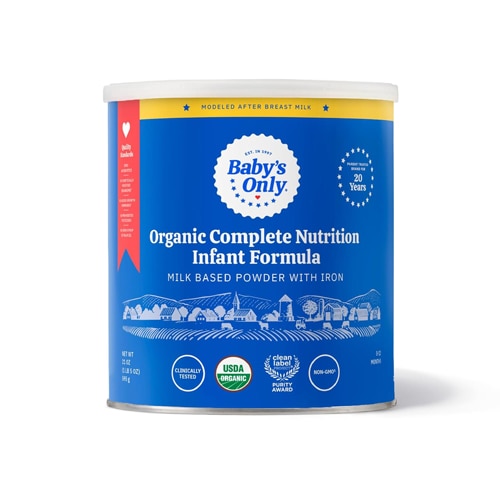[vc_row][vc_column][vc_column_text]Parents of newborns worry about every aspect of their baby's health, including whether their child is getting the right nutrients from
infant formula.
So, many moms and dads will be happy to hear that the U.S. Food and Drug Administration plans to review the nutrition quality of formula sold in the U.S.

'Operation Stork Speed': What parents need to know
The review -- which falls under an initiative dubbed "Operation Stork Speed" -- is the first of its kind in more than three decades.
The FDA is responsible for determining the standards for how infant formula sold in the U.S. is both made and stored. As part of the review, the FDA will determine whether nutrient requirements should be updated.
That process might include
adding new nutrients to formula requirements going forward.
In accordance with federal law, the FDA has now issued a request for information. It's unclear when the review will begin in earnest, or how long it will take.
However, the agency will accept public input on the matter between now and Sept. 11.
Infant formula is already one of the most highly regulated foods on the market, says Jill Castle, a registered dietitian nutritionist and pediatric dietitian who is the founder of
The Nourished Child.
However, Castle is hopeful that good things will come from the review, and that it will be carried out by qualified experts who have experience and knowledge in infant nutrition.
"I hope this review will prioritize science and safety, quiet misinformation, and establish trust in infant formula, especially for parents who are in the trenches of feeding their babies," she says.
Which nutrients do babies need from formula?
Getting the right nutrients early in life is crucial for a child’s long-term health and success. A baby’s organs develop rapidly during the child’s first year of life.
The American Academy of Pediatrics notes that babies who go without necessary nutrients for even a few days or weeks
might develop long-term issues that prevent them from growing strong and doing well in school.
Castle says today’s infant formulas are designed to closely mimic breast milk. The formulas include protein, fat, carbohydrates and micronutrients that help the baby’s brain, bones and body develop.
Other nutrients that must be present in infant formula are:
- Vitamins A, D, E and K
- Folic acid
- Iron
- Magnesium
- Zinc
“Many babies rely on infant formula to meet the totality of their nutritional needs,” Castle says.
In total, infant formula must contain 30 nutrients that have been shown to be important for a baby's normal growth and development.
The government has set standards for the minimum amounts of these 30 nutrients that must be present in formula. In addition, a maximum cap has been established for 10 of the nutrients that might pose potential harm if present in excessive amounts.
Babies typically also need additional supplementation in addition to what they receive from baby formula, Castle says.
"Most babies need an iron-fortified formula to prevent anemia and for optimal brain development," she says. "If a baby does not tolerate a formula with iron, they should receive supplementation, to be discussed with a doctor or dietitian."
Is homemade formula safe for babies?
Some frugal parents may be tempted to turn to homemade formula as a way to save money while feeding their babies.
However, the American Academy of Pediatrics discourages this approach, deeming it to be "risky."
It cites reports from the FDA that some babies who consume homemade formula end up hospitalized for low calcium, a condition known as hypocalcemia.
Homemade mixtures may lack important ingredients, such as iron and specific vitamins. Or, such mixtures may have too much of some types of ingredients, such as excess salt that can damage a baby's kidneys or liver.
In addition, some homemade formulas may inadvertently contain excessive amounts of other types of nutrients that can
lead to heart issues and seizures.
Castle also discourages parents from turning to homemade infant formula. She emphasizes that infants have highly specific nutritional requirements for optimal growth and development.
"Additionally, the risk for contamination is high, which is a real concern due to a baby’s immature immune system and ability to fend off bacterial infections," Castle says.
Choosing the right infant formula
Castle urges parents to discuss infant formula selection with their pediatrician or a registered dietitian.
“The options on the market are many, and selecting the right one can be a daunting task for families,” she says.
Parents should weigh their infant’s individual needs because this will inform their selection.
Most full-term babies will find that formulas based on cow’s milk, goat’s milk and soy milk are all well-tolerated, Castle says.
She adds that an allergen-free formula is necessary for babies who have an allergy, sensitivity or intolerance to specific ingredients.
“Pre-term formulas are specifically designed for babies born prematurely and have higher nutrients to help them mature outside of the womb,” Castle says.
Once parents have settled on the best option for their child, they should carefully read labels and check expiration dates when shopping, Castle says.
"If they purchase from a store in the U.S., the formula will have been reviewed through the FDA review process," she says. "If purchased online or from a source outside of the country, it has likely bypassed this process."
For this reason, the American Academy of Pediatrics discourages parents from using imported formulas.
In addition, the academy offers the following tips to parents:
- Avoiding adding water to formula, which can dilute nutrients.
- Steer clear of using toddler formula for babies under 12 months. Toddler formulas may have nutrient profiles that are inappropriate for infants.
- Turn to government assistance if you cannot afford infant formula.
[/vc_column_text][/vc_column][/vc_row][vc_row][vc_column][vc_text_separator title="Featured Products" border_width="2"][vc_row_inner equal_height="yes" content_placement="middle" gap="35"][vc_column_inner width="1/3"][vc_single_image image="185431" img_size="full" alignment="center" onclick="custom_link" img_link_target="_blank" css=".vc_custom_1749677875018{padding-right: 7% !important;padding-left: 7% !important;}" link="https://www.vitacost.com/kabrita-goat-milk-toddler-formula-12-24-months"][/vc_column_inner][vc_column_inner width="1/3"][vc_single_image image="185430" img_size="full" alignment="center" onclick="custom_link" img_link_target="_blank" css=".vc_custom_1749677892350{padding-right: 7% !important;padding-left: 7% !important;}" link="https://www.vitacost.com/earths-best-organic-gentle-infant-formula-with-iron-milk-based-powder"][/vc_column_inner][vc_column_inner width="1/3"][vc_single_image image="185429" img_size="full" alignment="center" onclick="custom_link" img_link_target="_blank" css=".vc_custom_1749677912918{padding-right: 7% !important;padding-left: 7% !important;}" link="https://www.vitacost.com/babys-only-a2-organic-infant-formula-milk-based-powder-with-iron"][/vc_column_inner][/vc_row_inner][/vc_column][/vc_row]





